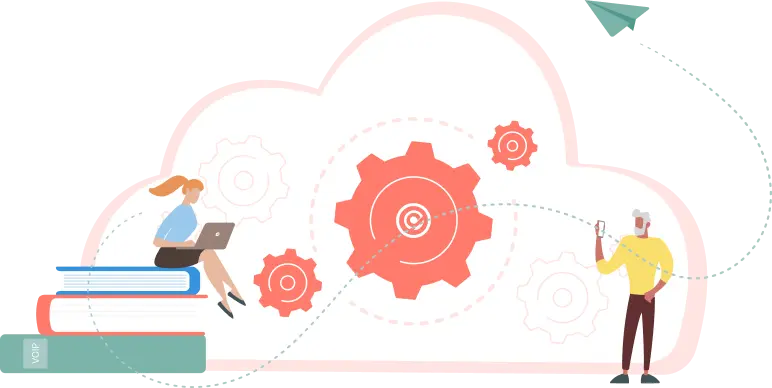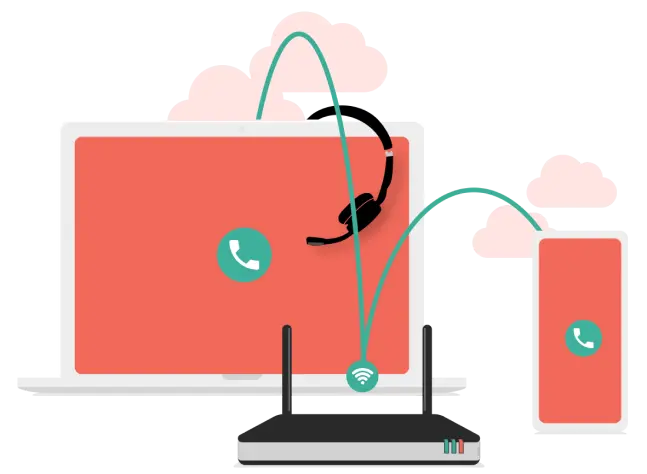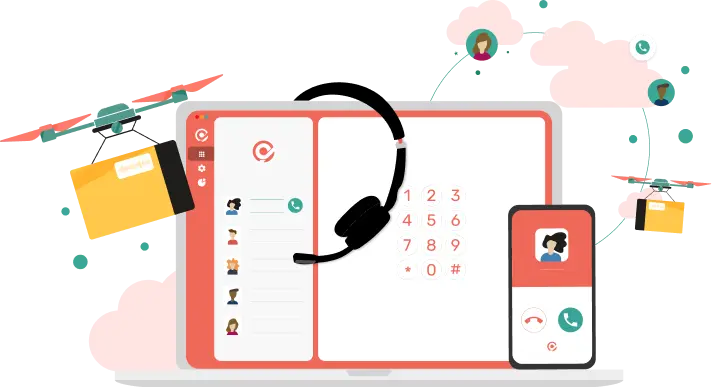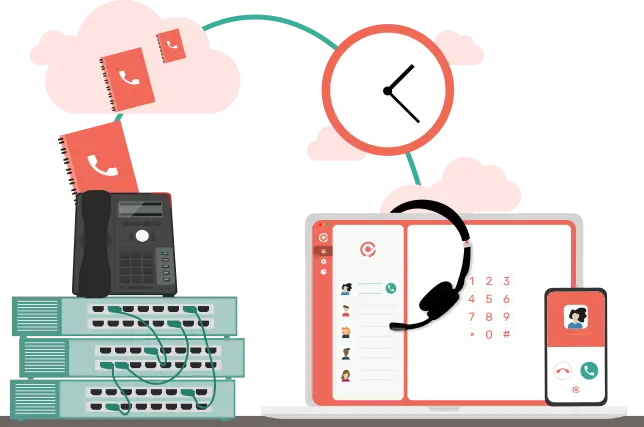
What is VoIP and how does it work? The ultimate guide
VoIP has revolutionised cloud-based communications for businesses around the world. Giving them flexibility that just can’t be offered by traditional phone systems.
We’re here to help you understand everything you need to know about VoIP, and why a VoIP phone system is the best option for your new business phone system

Voice over ip
What is VoIP?
VoIP, or Voice over Internet Protocol, is a technology that enables the transfer of voice communications over IP networks. It allows users to make phone calls over the internet without the need for a traditional landline. VoIP is a flexible and cost-effective alternative to traditional phone systems and is often referred to as IP telephony or internet calling.
With advancements in software and hardware, VoIP can offer high-quality calls on the go, providing voice communications without a fixed location and avoiding installation costs and hardware overheads.

Functionality
How does a VoIP phone system work?
A VoIP service works a little differently from a PSTN. When you transmit your voice via IP you aren’t sending it down a phone line, you’re converting it into a digital packet then transmitting it via IP. It’s a simple process of convert, transmit and unpack. It works something like this:
- A codec converts your data into a digital ‘packet’.
- The packet is then transmitted via IP.
- The data packs arrive at their destination.
VoIP systems can work within existing systems and do not require a specialized device for the recipient or caller. The final packet can be converted back to run on a standard phone line, and hardware can be enabled with VoIP software, providing access to more features. CircleLoop offers VoIP phone system access through computer apps and physical phones if needed.
Trade-offs
The Pros & Cons of VoIP phone systems
VoIP (Voice over Internet Protocol) phone systems offer several advantages and disadvantages that can impact businesses and individuals. Here's a small description of the pros and cons of VoIP phone systems:
Pros
- Keep line rental costs low
- No need for costly equipment
- Access from anywhere
- Add users and numbers quickly and painlessly
- No fixed term contract
- Excellent voice quality
- No landline needed
- Use on desktop, mobile or with softphones
- Works on 4G and 5G when you have a good signal
Cons
- Dedicated bandwidth needed
- Potential for latency
- A reliable internet connection needed
Pricing
What does a VoIP system cost for businesses?
One of the best things about VoIP is its low point of entry. Not only do you not need a physical phone line and hardware, but the line rental costs are low and the installation costs are non-existent.
This means that business VoIP phone systems are incredibly affordable. Our own service, for instance, starts at just £5 per user per month and comes with a wide array of features that you have to pay extra for on a landline. Call charges can be a lot lower, and some packages come with inclusive minutes.
As there’s no need for an engineer to come out and install your phone system or a need for purchasing expensive hardware, VoIP is a cheap communication solution for any business.

Setting up
Switching to VoIP
Setting up a new VoIP phone system with CircleLoop is quick and easy, as there is no need for an engineer or hardware to be delivered. By signing up and downloading the app, you can start using the service right away.
Additionally, CircleLoop allows for the porting of old numbers and importing of contacts from address book tools like Office 365 or CRO tools, directly into the VoIP phone system.
Before you switch though, it’s worth doing a few things:
- Check you have a strong, reliable internet connection and that you can optimise your router for voice
- Put aside some time to train your team on your new system
- Test your new system with a free trial
Circleloop
Types of VoIP systems
You’ll have three options; a physical VoIP enabled desk phone, a computer app or a smartphone app. Each will have different equipment needs. If you’re looking for VoIP phone hardware we can help, with headsets, speakers and VoIP enabled deskphones.
VoIP deskphone
You’ll need a VoIP adapter, a VoIP enabled desk phone and then a router that allows you to connect your phone directly to it using an ethernet cable.
VoIP via computer
You’ll need a laptop, desktop or Mac. For best quality possible we’d recommend an ethernet connection, but you may be ok with WiFi if your internet is good. Then you’ll need a VoIP phone app, like CircleLoop, and a headset for best call quality.
VoIP via smartphone
You’ll need a smartphone with your VoIP app installed. Ideally we’d recommend you use the app on WiFi where possible over 4G or 5G.
equipment
What do I need for a VoIP phone system?
While a VoIP phone system offers great flexibility, and doesn’t require a landline, there are a number of things you may need to get going.
No matter how you’re going to be communicating, the absolute essential is a quality broadband connection that offers enough bandwidth to make your calls clear alongside any other internet needs within your business. We’d recommend a fibre optic connection for best quality and unlimited downloads is important. So that’s:
- Broadband connection, preferably fibre optic
- Router
- Ethernet connection for computer or phone
Circleloop
VoIP Glossary
At CircleLoop we understand how irritating all the acronyms and jargon can be. So we’ve put together a quick glossary so you can understand the VoIP technical terms at a glance.
LAN
Port your old number over to CircleLoop, so you haven’t got to worry about losing key inbound prospects.
PBX
Otherwise known as a private branch exchange. Essentially it’s an office phone network. It’s what lets you port calls around your organisation.
RTP & SRTP
Short for (secure) real-time transport protocol. It’s the internet protocol that transmits your voice data packets. The secure version encrypts your data.
IVR
Interactive Voice Response is the ability to make an interactive menu that uses voice commands. Learn more about IVR greetings & menus.
IP
The ‘internet protocol’ that provides the rules for transmitting data online. It’s these rules, which are standardised, that allow mismatching platforms to communicate. For instance, an app-based phone communicating with a physical phone.
Codec
Codecs aren’t unique to VoIP. They’re a device or software that is used to compress, encode and decompress data. For VoIP systems, they are used to convert the voice data before and after transmission.
DSL
This is the technology that’s used to transmit data over a telephone line. It’s what lets you use both broadband internet and your phone line at the same time.
Softphone
Essentially a software phone. This means it’s either a piece of standalone computer software or an app that lets you make a call. They usually have a phone interface for ease of use.
Do You Have Questions?
Frequently Asked Questions
Take a look at the most frequently asked questions and don't hesitate to contact us if you need further assistance
What do I need for a VoIP phone system
The point of entry for a VoIP system is low. All you need is a reliable internet connection and the software or hardware.
For CircleLoop we recommend using our desktop apps for best results, but we have mobile apps too. All you need to do is install them and you’re good to go.
Is VoIP reliable?
VoIP is as reliable as your internet connection. We think this makes it even more reliable than a traditional business landline. There are less chances for any problems that you can’t control.
Do I need a physical handset for a VoIP system?
You don’t need a desk phone or headset. You can run your calls through your desktop or smartphone mics and speakers.
For best sound quality a headset is useful and we can help there. We have Jabra headsets and can sort you out with desk phones if you need them
Shop from our hardware.
Can I port my old number to a VoIP system?
Absolutely! We are happy to help you port your old number over, whether it’s from a traditional landline or another VoIP service.
Do you need a phone line for VoIP?
No, you don’t! All you need is access to the internet. You don’t need physical wiring, but you will need to have broadband and a router.
Is VoIP cheaper than a landline?
Yes! Without the need for installation costs, engineers and hardware, a VoIP phone system can be significantly cheaper.
CircleLoop’s cloud-based phone system starts at just £5 per user per month with all its features included too, so we’re confident that it’s one of the cheapest ways to set up a business phone system.
Check out our pricing.
Can a VoIP number be traced?
Yes, a VoIP number can be traced. Even though a VoIP system allows for virtual numbers, they can still, with some effort, be traced back to the original source.
Are you ready?
Start your 7 day free trial today.
Set-up in minutes, no credit card required.
